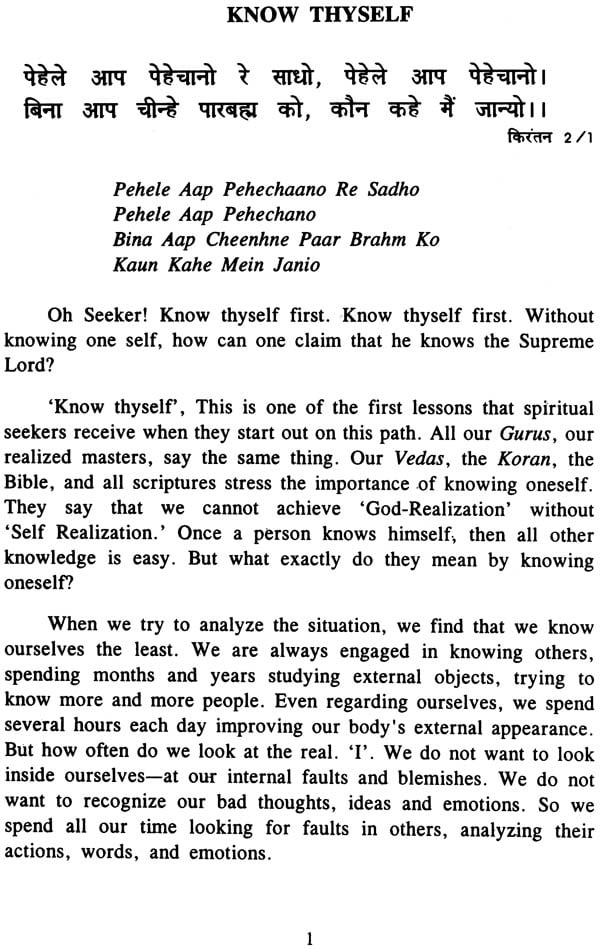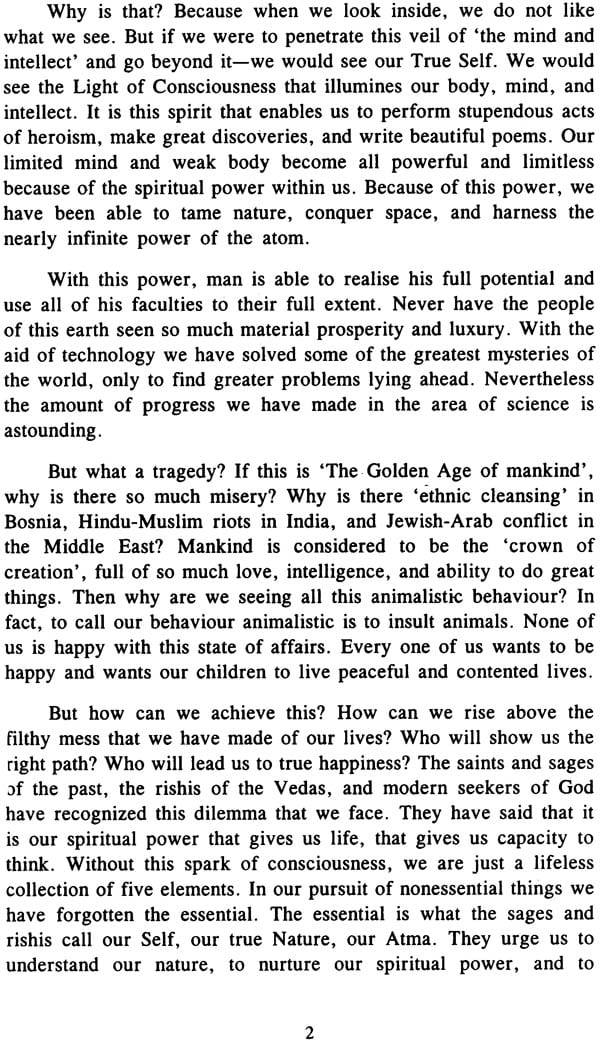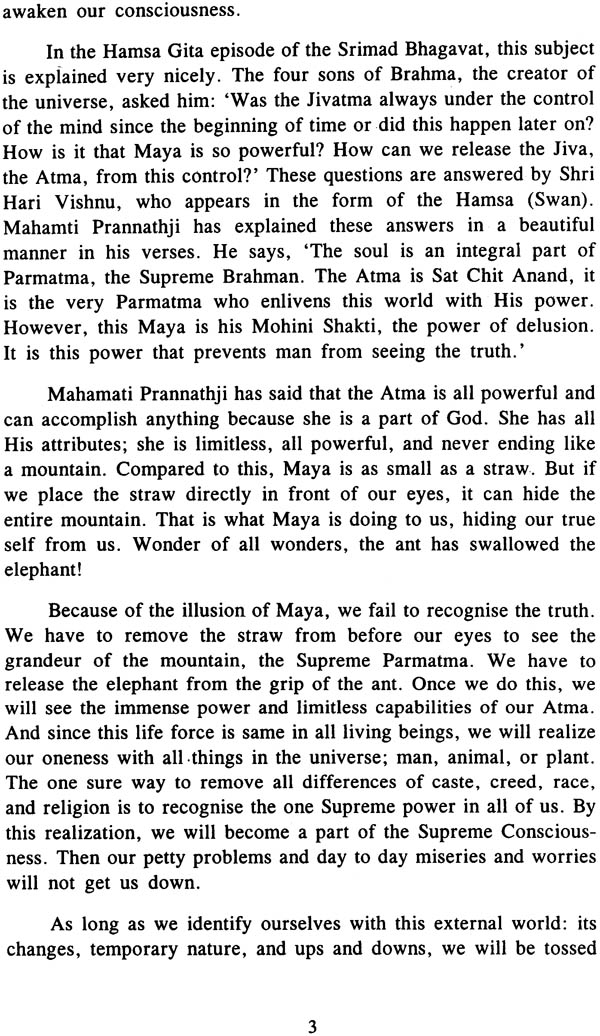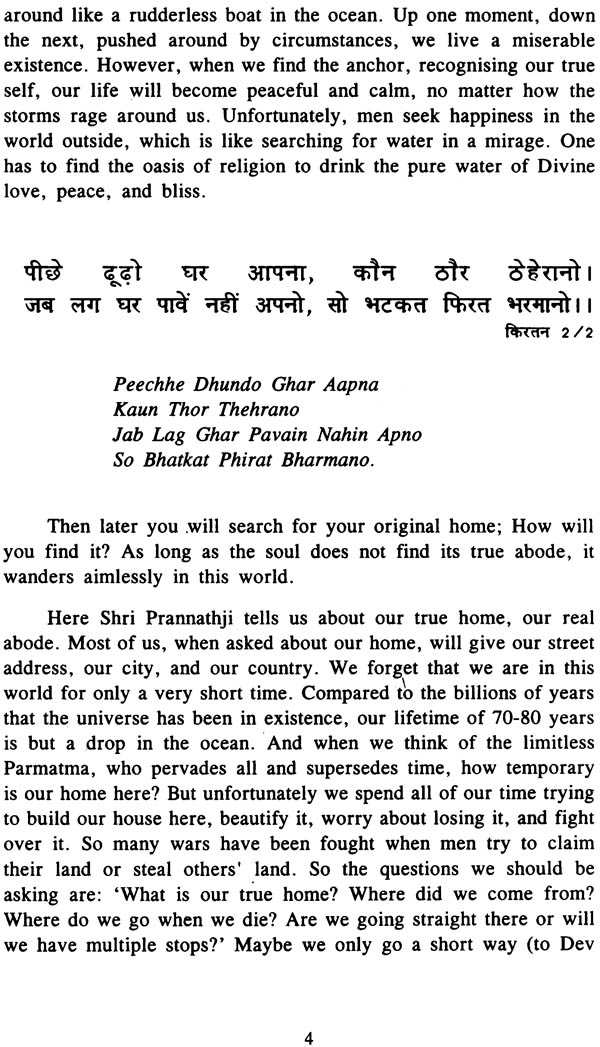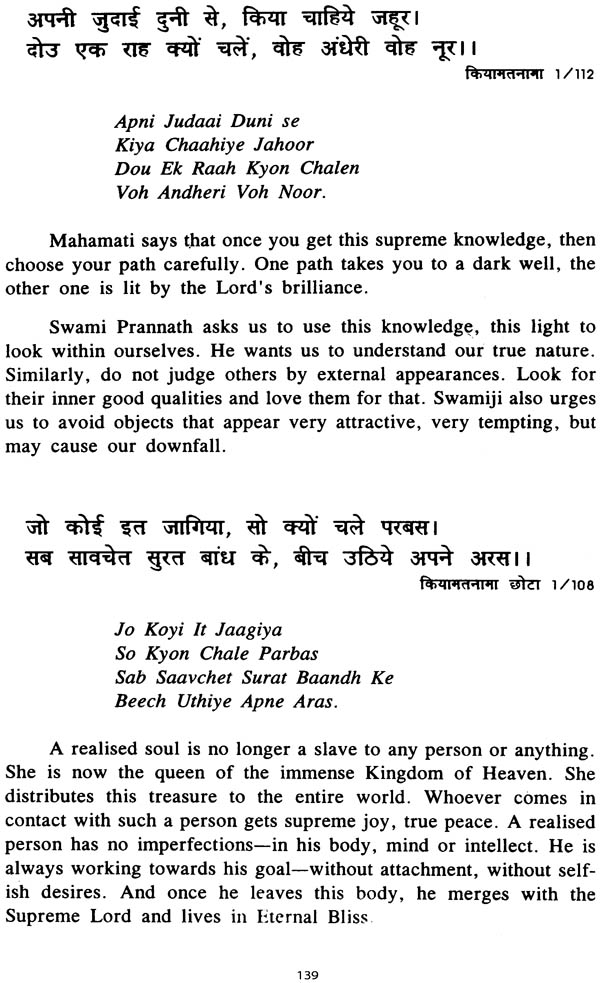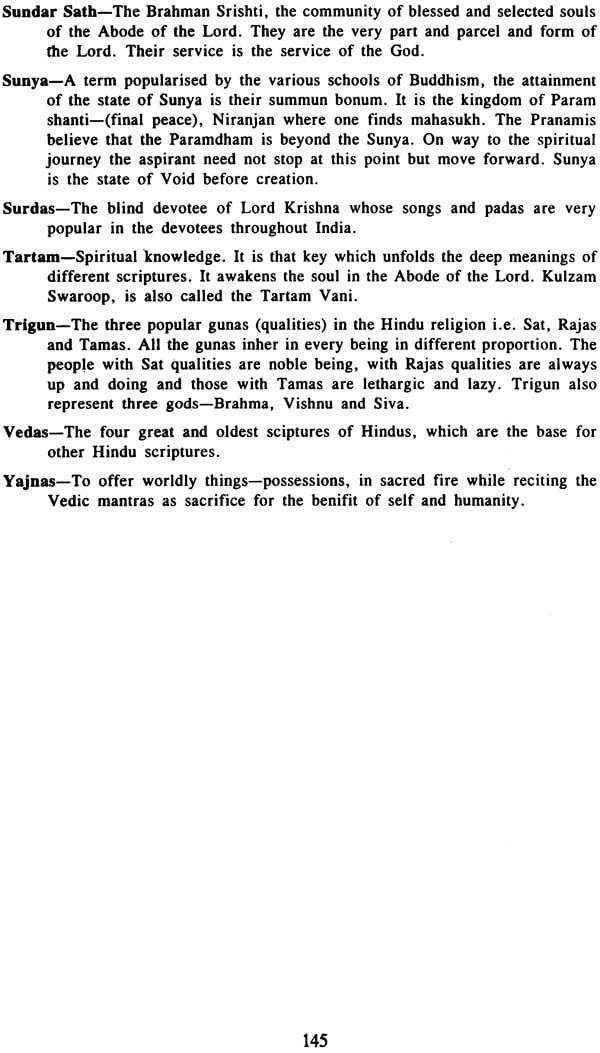
The Search Within Based on Mahamati Prannath's Tartam Vani
Book Specification
| Item Code: | NAL535 |
| Author: | Dr. Anil Mehta |
| Publisher: | Shri Prannath Mission |
| Language: | Hindi Text With Transliteration and English Translation |
| Edition: | 2000 |
| ISBN: | 0963857959 |
| Pages: | 170 |
| Cover: | Hardcover |
| Other Details | 9.5 inch X 6.5 inch |
| Weight | 420 gm |
Book Description
Writes Dr. Mehta
Let us rise above the bondages of body, mind, and intellect. Let us see more that! what is perceived by our senses. Let us think and experience more than what can he accomplished by the mind and intellect. Let us recognise and experience the Divine Spark that is in all of us. Let us know ourselves and free ourselves of all bandages.
People of this world are constantly engaged in rituals, the 'externalities' of religion. They have forgotten the true essence of its teachings. That has given rise to divisions, differences among them. Budhji came and showed everyone the path of love. This is the path of devotion to the Lord. This will bring everyone together.
Religion is not merely a collection of stories and teachings-s-it is the art of living. It teaches us not to renounce the world and run away in the forest or the Himalayas. It shows us the right way to conduct ourselves in this world, with maximum efficiency and success.
What we have done is 'chained' our religious masters, our prophets. We have tied them with ropes of Hinduism, Islam, Christianity. They came here for the entire world, not for one group of people. Let us free them, let its spread their Knowledge to everyone. Let us acquire knowledge from everyone-from all the sources. Let us be liberal, let us be accepting.
'Truth is One; Wise speak of it in many ways,' said the Vedas .. Religions are many, spirituality is one. Great saints recognized oneness Of all humanity. They employed different languages and symbols, but knew the underlying essence to be the same. The followers however tend to stick to externalities and, as a result, unbelievable amount of misunderstanding, divisions and even violence have occured in human history in the name of religion. This is a recurring problem of the world. God, in His infinite mercy, sends His chosen messengers time and again to bring the light of right understanding to the misguided masses. Mahamati Sri Prannathji was surely a special instrument in God's hands that came on earth for the benefit of us all.
It has been immensely delightful for me to go through the manuscript of this book, 'The Search Within', on the teachings of Swami Prannathji. Eternal values of life like honesty and self- control, devoted surrender to the Almighty God, service to fellowbeings and the pursuit of Self-knowledge are the foundation of any faith with universal relevance. The teachings of Swamiji embody these essentials. Dr. Anil Mehta has compiled many bright gems of wisdom from the great works of the Master and has provided lucid commentary on the saint's words. Starting with a life-sketch of Swamiji, Dr. Mehta has presented the material under more than a dozen important titles. I see that he blends a flavor of Vedanta (the upanishads) into his explanations. For example, the discussion on- the two choices before us viz. 'the pleasant (prey a)' and 'the good (shreya)' (in the chapter, 'precious gift') and the comparison of our body with a chariot in this journey of life (in the chapter on Sadhana) remind us of the celebrated dialogue between Nachiketa and Yama, the Lord of death in the Katha Upanishad.
The book can give good education with great reading pleasure to the young and old, with its lucid presentation along with many illustrative stories. In the chapter on 'Maya,' for example, a camel believes that he is tied, while actually there is no rope! The imagined bondage is undone by gestures by men that make the camel imagine again that he is free now. How similar is the human predicament! Mere thoughts, in the form of various prejudices, notions and complexes, make us suffer the pangs of desire, anger, jealousy etc. Spiritual practices bring about a new set of thoughts, in the form of values, concepts of the Self (Atman), God etc. and, ultimately, we realize that Awareness Principle which is beyond all thoughts or concepts. A second thorn used to remove a thorn!
Powerful metaphors bring great force to Swamiji's teachings. For example, the one in the chapter on 'voyage' depicts the soul as sailing upon the ocean of life, with the body as the boat that is tossed about by the waves of maya. Who can deny the miseries of human life? 'The poor are uncomfortably unhappy, the rich are unhappy comfortably!', said Swami Chinmayanandaji. He also ob- served, 'the tragedy of humanity is decreasing happiness amidst increasing comforts'. These remarks are based on facts and are not a cry of pessimism. However, the saving grace is that we do attain true peace and fulfilment in life when we bring order in our inner life. A true spiritual teacher guides us to drop all our egoistic attitudes. In egolessness, the true Self shines forth in us, in the full spelndor of its natural peace.
Mahamati Prannathji' s call is for true love to brighten our lives. Pure love, and not selfish attachments, heal all the wounds of our mind. In the chapter on 'Jagni (awakening),' Dr. Mehta conveys to us the teaching of the Master on love, love of God and how it is really our true nature. The ugly possessiveness towards what we like and the absurd hatred towards what we do not like are sad deviations from our innate divinity. The misconstrued and confused ego thrives on impure attachments. True spirituality disbands the false ego along with all its vicious allies, restoring to us the security and eternal contentment of the Self. Then the fragrance of love emanates from every pore of the saint uncovered.
Unity of all religions and harmony between all faiths were deep motivation for much of Swamiji's work. 'There are so many religions, but very few religious people,' observes Dr. Mehta in the chapter on 'Universal Truth.' True Muslims, true Christians, true Hindus and so on can not seek others' blood in the name of their religion. 'We have chained our religious masters,....... they came here for the entire world, not for one group of people. ....let us be liberal. '-these words in the book can be eye-openers for many ignorant fanatics.
The Kulzam Swarup consisting of fourteen books by Mahamati Prannathji is indeed a spiritual treasure and now this book in English is a great introduction to it. I congratulate Dr. Anil Mehta and his mother who inspired the venture. May the Almighty Lord bless them and strengthen their hands to render more such service to seekers of truth everywhere.
In Medieval India, there was a great need for religious unity and understanding. Mahamati Prannath performed this task through spiritual awakening-Jagni. With the help of Tartam-the integral knowledge-he solved the riddles of all the religious books. He explained the inner meanings of these scriptures in such a way that all people could understand and respect them. He demonstrated unity in the basic ideas of all religions. He told the people that truth is one-do not try to split it into different parts. 'See the whole truth and propagate it.' Mahamati preached this universal message. His followers came from different sects and religions. They accepted his faith and spread his teachings far and wide.
Mahamati showed his followers the path of truth, non-violence, service, co-existence, unity and peace. They all lead a simple life. Rich or poor, king or subject, they all stayed together and ate together. He tried to establish a society free from distinctions of caste or creed.
He preached that religion should be one for the whole humanity. Science, history -and geography are the same subjects through- out the world. Why can't we then have one subject-religion-that all people can study? Religion should be a unifying force. But unfortunately, religion has become a source of division, of friction. We call ourselves Hindus, Jains, Sikhs, Christians, Muslims. We believe in one God but do not accept His message coming through different speakers at different times. Mahamati has brought out the gist of all the scriptures in his Kulzam Swaroop-which means the sum total of all spiritual knowledge. We get a broad idea of what the major religious scriptures have to offer for the welfare of humanity.
Today, we are trying to unite the world through organisations like the UNO. The path of unity is through spirituality. If we could study Kulzam Swaroop without bias and see the scriptures of the world in the light of Tartamya, our entire outlook would change: Human love and service-that is what we need. This awareness will bring human beings closer to each other.
Dr. Anil Mehta's effort to explain Mahamati Prannath' s philosophy in simple language is highly commendable. In fourteen chapters, he has covered very well different aspects of Prannathji' s teachings. This book will help students of spiritual knowledge to gain a true picture of the Universal Truth.
Dr. Mehta's book is a great treatise for the readers of philosophy. The language is simple and attractive. The choice of words is impressive. Once you start reading this book, you will not put it down.
This book will definitely help seekers of the truth and all those who like to search within. Our complements and best wishes to Dr. Mehta in his future endeavours.
'It was the best of times, the worst of times'. These words can describe very well the state of the world today. Technology is at its zenith. The world has become a small place. Fax machines, Modems, Internet have broken national boundaries. The dictatorial regimes are slowly crumbling and mankind is marching towards personal freedom, economic self-sufficiency, political maturity.
But has this knowledge made man any wiser? Are we really happy? The world is smaller, but are we getting closer to our fellow man? Is there more love and tolerance for each other? Do we respect each other's views and beliefs? The answer is No! We see so much conflict in the name of religion. The conflict in Serbia, the battles in the Middle East, riots in India-all point to our failure. We read religious books but do not become religious. We build temples, churches and mosques, but do not invite God to live in them. We make them places for preaching communal hatred. God never intended this. No religious preacher advised his followers to kill others to spread own faith. It is our misinterpretation of the teachings of great prophets that has caused this conflict, this misery.
Our prophets gave us the universal truth. In our ignorance, we call them Hindu saints, Muslim prophets, Christian preachers. We have tied them in chains, we have restricted their knowledge. So what is the solution? Where should we turn for true knowledge? Who will lead us to universal peace and brotherhood?
This question was answered clearly and very beautifully by a great progressive Saint 'Mahamati Prannath' who was born in Jamnagar, India in 1618 A.D. Three hundred years ago, he created a model of religious unity, a concept of world religion-(Vishva Dharma). This idea was supported by references and quotations from different scriptures of the world, 'Ved' (Hindu) and 'Kateb' (Semitic). He taught us the true meaning of religion. His teachings can serve as the framework for a true United Nations-a Parliament of Religions.
Swami Prannath-Meheraj Thakur (1618-1694 A.D.) was the son of Keshav Thakur-Dewan of Jamnagar and Smt. Dhanbai, a very pious lady. He was the third amongst five sons. At an early age. he was well versed in worldly knowledge. His father dreamt of making him Diwan (minister of the state) after him. But Meheraj was destined for higher things. At the age of twelve, he met his guru Shri Devchandraji.
Shri Devchandra was a great saint of his time. He was born in the house of Matu Mehta and Kunwar Bai in Umarkot, Sindh, now in Pakistan. Even at the tender age of five, people would find Devchandra lost in contemplation. He would often wonder, 'Who am I?' 'Where have I come from?' 'Who is the creator of this world?' 'Why is there so much sorrow and misery all around?' He was very fond of the company of saints. He would ask them all these questions, but no one could satisfy him.
At the age of sixteen, Shri Devchandra left his home to search for the truth. He went to Bhojnagar (in Gujarat) where he met many saints. Each one suggested a different form of worship. Shri Devchandra followed all their suggestions. He carried out a lot of penance but did not get answers to his questions. He soon got tired of the rituals and unnecessary superstitions carried out in. the name of religion.
He was in search of a true form of religion, a sure and easy way to reach the Lord. His firm conviction was that to live a noble life is far more important than mechanically doing Pooja and chanting the prayers.
When Devchandra explained this to the people, they realised that he had understood the true form of religion.
Shri Devchandra told them to nourish the soul. 'A glimpse of God and listening to the tales of His glory are as important for the spirit as is food for the body.'
After years of self-discipline, study and listening to the Bhagvat from a learned teacher, Shri Devchandra attained his goal. He got a glimpse of the Lord and felt Supreme Bliss. Shri Krishna, the Lord Supreme, appeared before him, and asked him the questions, 'Who are you? Why have you come to this world?' 'My Lord,' replied Shri Devchandra, 'You are asking me the same questions which have been disturbing me since my childhood. I am conscious of your presence and know that you are my saviour. Please clear my doubts and show me the right path.'
Lord Krishna then gave him the 'Tartam Mantra', which dispelled all his doubts. Tartam is a Sanskrit term consisting of two words 'Tar' and 'Tam'. It means knowledge above and beyond this universe. Tartam is the integral knowledge which shows the relationship between the perishable world, the imperishable entity of Akshar Brahma and the Lord Supreme. The Lord then said, 'You have come here from Paramdham, my eternal Abode. My consort Shyama (blissful state) is in you. With other enlightened souls, you have come to this world to experience joy and suffering. Unfortunately, these souls are lost in the mirage of the world. I am giving you the Mantra-the power to awaken them. Bring them back to their original true home.' This movement of awakening of souls is known as 'Jagni'. Shri Devchandra started the work assigned to him by the Lord. Many souls were awakened to their true original state and they experienced eternal bliss.
Shri Devchandra became very popular. Large crowds would gather at his congregations. His preachings contained the essence of all the Hindu scriptures. He explained that Sachidanand (God Supreme) symbolised Truth, Consciousness and eternal Bliss. This illusory, sorrowful world has been created for the eternal souls, so that they may better appreciate their true Sachidanand state. Shri Devchandra told the people, 'After having these experiences, you have to go back to your original home.'
| 1 | Foreword | (i) |
| 2 | Preface | (iv) |
| 3 | Mahamati Prannath A Brief introduction | (vi) |
| 4 | Know Thyself | 1 |
| 5 | Maya | 8 |
| 6 | Creation | 17 |
| 7 | The World is a Stage | 26 |
| 8 | The Human Body-a Precious gift | 36 |
| 9 | The Search | 45 |
| 10 | Sadhana - Dedicated Effort | 53 |
| 11 | The Voyage | 68 |
| 12 | The Value of Sorrow, the Joy of Separation | 81 |
| 13 | God's Will, Grace or Action | 90 |
| 14 | Jagni - A wakening | 99 |
| 15 | Universal Truth | 108 |
| 16 | The Joy of Eternal Union | 122 |
| 17 | The Realised Soul | 132 |
| 18 | Glossory | 141 |
